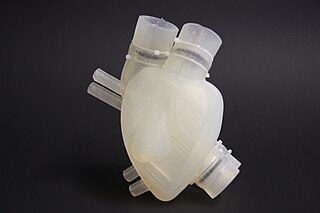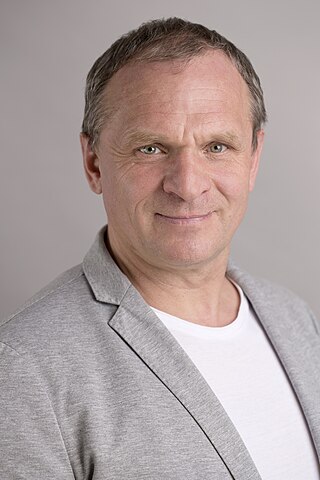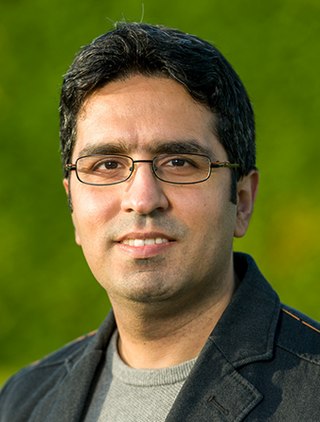
Organ printing utilizes techniques similar to conventional 3D printing where a computer model is fed into a printer that lays down successive layers of plastics or wax until a 3D object is produced. In the case of organ printing, the material being used by the printer is a biocompatible plastic. The biocompatible plastic forms a scaffold that acts as the skeleton for the organ that is being printed. As the plastic is being laid down, it is also seeded with human cells from the patient's organ that is being printed for. After printing, the organ is transferred to an incubation chamber to give the cells time to grow. After a sufficient amount of time, the organ is implanted into the patient.

The Methuselah Foundation is an American-based global non-profit organization based in Springfield, Virginia, with a declared mission to "make 90 the new 50 by 2030" by supporting tissue engineering and regenerative medicine therapies. The organization was originally incorporated by David Gobel in 2001 as the Performance Prize Society, a name inspired by the British governments Longitude Act, which offered monetary rewards for anyone who could devise a portable, practical solution for determining a ship's longitude.

David Gobel is an American philanthropist, entrepreneur, inventor, and futurist. He is co-founder and CEO of the Methuselah Foundation, CEO of the Methuselah Fund, and one of the first to publicly advance the idea of longevity escape velocity, even before this term was formulated.
Christoph Westphal is an American biomedical businessman.

The lung-on-a-chip is an organ-on-a-chip device modelling a living, breathing human lung on a microchip. The lung-on-a-chip places two layers of living tissues—the lining of the lung's air sacs and the blood vessels that surround them—across a porous, flexible boundary. Air is delivered to the lung lining cells, a rich culture medium flows in the capillary channel to mimic blood, and cyclic mechanical stretching is generated by a vacuum applied to the chambers adjacent to the cell culture channels to mimic breathing. The device is made using human lung and blood vessel cells and it can predict absorption of airborne nanoparticles and mimic the inflammatory response triggered by microbial pathogens. It can be used to test the effects of environmental toxins, absorption of aerosolized therapeutics, and the safety and efficacy of new drugs. It is expected to become an alternative to animal testing.

Donald E. Ingber is an American cell biologist and bioengineer. He is the founding director of the Wyss Institute for Biologically Inspired Engineering at Harvard University, the Judah Folkman Professor of Vascular Biology at Harvard Medical School and Boston Children's Hospital, and Professor of Bioengineering at the Harvard John A. Paulson School of Engineering and Applied Sciences. He is also a member of the American Institute for Medical and Biological Engineering, the National Academy of Engineering, the National Academy of Medicine, the National Academy of Inventors, and the American Academy of Arts and Sciences.
Atlas Venture is an early-stage venture capital firm that creates and invests in biotechnology startup companies in the U.S. Atlas is headquartered in Cambridge, Massachusetts, where the majority of its investments are located. Atlas raised its thirteenth fund totaling $450 million in March 2022, after raising its Opportunity Fund II totaling $300 million in September 2021.
An organ-on-a-chip (OOC) is a multi-channel 3-D microfluidic cell culture, integrated circuit (chip) that simulates the activities, mechanics and physiological response of an entire organ or an organ system. It constitutes the subject matter of significant biomedical engineering research, more precisely in bio-MEMS. The convergence of labs-on-chips (LOCs) and cell biology has permitted the study of human physiology in an organ-specific context. By acting as a more sophisticated in vitro approximation of complex tissues than standard cell culture, they provide the potential as an alternative to animal models for drug development and toxin testing.
Xconomy was a media company providing news on business, life sciences, and technology focusing on the regions of Boston, Boulder/Denver, Detroit, New York City, Raleigh-Durham, San Diego, San Francisco and Seattle. The website was launched in June 2007 by founders Robert Buderi and Rebecca Zacks. Xconomy content covered "local personalities, companies, and technological trends to business and technology leaders" with a target audience of "entrepreneurs, business and technology executives and innovators, venture capitalists, angel investors, lawyers, and university researchers and officials." Bill Mitchell of the Poynter Institute described Xconomy in 2010 as reflecting "the insiderish feel of, say, Politico, but with some of the familiarity that you might expect from a small town paper."
Alnylam Pharmaceuticals, Inc. is an American biopharmaceutical company focused on the discovery, development and commercialization of RNA interference (RNAi) therapeutics for genetically defined diseases. The company was founded in 2002 and is headquartered in Cambridge, Massachusetts. In 2016, Forbes included the company on its "100 Most Innovative Growth Companies" list.
Gelesis is a biotechnology company located in Boston, Massachusetts that developed the weight loss device Gelesis100 (Plenity) for use in overweight and obesity. The company produces Gelesis100, which is a superabsorbent hydrogel capsule that expands in the stomach, creating a feeling of fullness, helping people reduce the amount of food they eat. The company was founded in 2006 to develop medical devices and treatments for obesity.

Scientist.com is a network of public and private e-commerce marketplaces that connect buyers and sellers of scientific research services. The company was founded in 2007 by Kevin Lustig, Chris Petersen and Andrew Martin and launched its first public research marketplace in September 2008.

Uwe Marx is a German physician and biotechnologist, and one of the world’s leading researchers in the fields of organ-on-a-chip technology and antibody production.

Insilico Medicine is a biotechnology company based in Pak Shek Kok, Hong Kong in Hong Kong Science Park near the Chinese University of Hong Kong, and in New York, at The Cure by Deerfield. The company combines genomics, big data analysis, and deep learning for in silico drug discovery.

3Scan, Inc. was an American biotechnology company based in San Francisco, California which was acquired in 2019, when 3Scan became a part of Strateos. It offered automated microscopy services using a coordinated combination of both hardware and software for the 3D analysis of cells, tissues, and organs. The company was founded in 2011 by Todd Huffman, Megan Klimen, Matthew Goodman, and Cody Daniel. The 3Scan technology is based on the Knife Edge Scanning Microscope developed in the late 1990s by Bruce McCormick, founder of the Brain Networks Lab at Texas A&M University.

Classy is a software company and online fundraising platform designed for nonprofit organizations. Headquartered in San Diego, California, Classy was founded by CEO Scot Chisholm, Pat Walsh, and Marshall Peden in 2006, originally to host fundraising events that benefit charities. The firm transitioned to a software and services company in 2010. Its software as a service products launched in 2011 and focus on peer-to-peer fundraising, crowdfunding, events, supporter management and marketing automation. In September 2016, Classy closed $30 million in Series C funding from JMI Equity, Peter Thiel's Mithril Capital, Salesforce Ventures, and Bullpen Capital. In April 2021, it raised $118 million in series D funding, making Classy a Public Benefit Corporation.

Intellia Therapeutics, Inc. is an American clinical-stage biotechnology company focused on developing novel, potentially curative therapeutics leveraging CRISPR-based technologies. The company's in vivo programs use intravenously administered CRISPR as the therapy, in which the company's proprietary delivery technology enables highly precise editing of disease-causing genes directly within specific target tissues. Intellia's ex vivo programs use CRISPR to create the therapy by using engineered human cells to treat cancer and autoimmune diseases.

Alireza Mashaghi is a physician-scientist and biophysicist at Leiden University. He is known for his contributions to single-molecule analysis of chaperone assisted protein folding, molecular topology and medical systems biophysics and bioengineering. He is a leading advocate for interdisciplinary research and education in medicine and pharmaceutical sciences.
Samira Musah is an American biomedical engineer and professor at the Duke University Pratt School of Engineering. She is known for her work in biomimetic systems, in particular for her work in developing an organ-on-a-chip model of the kidney glomerulus during her postdoctoral fellowship.
The Wyss Institute for Biologically Inspired Engineering is a cross-disciplinary research institute at Harvard University focused on bridging the gap between academia and industry by drawing inspiration from nature's design principles to solve challenges in health care and the environment. It is focused on the field of biologically inspired engineering to be distinct from bioengineering and biomedical engineering. The institute also has a focus on applications, intellectual property generation, and commercialization.












